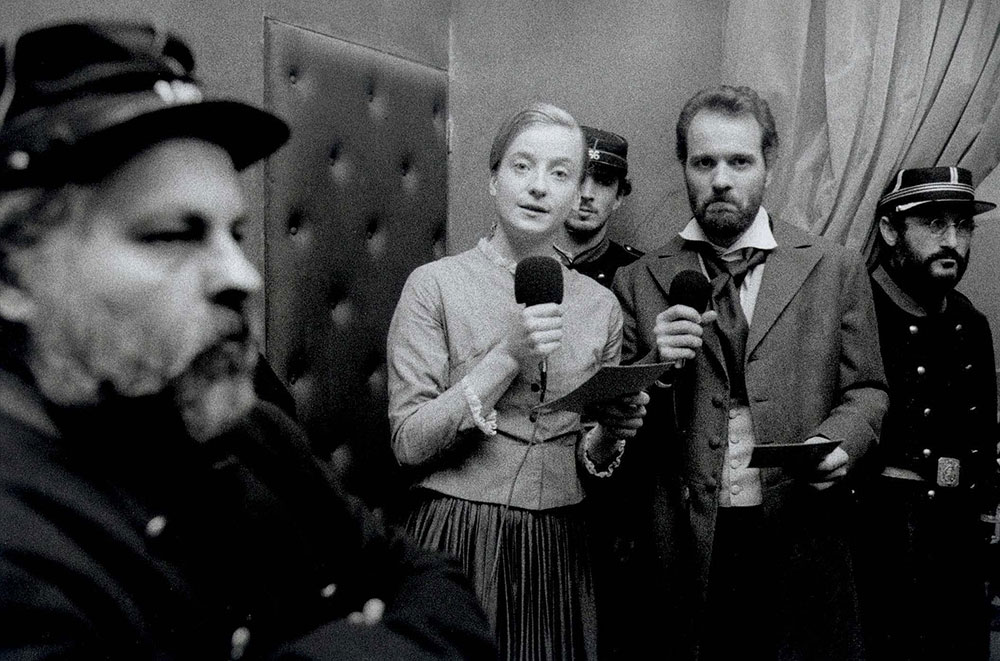Peter Watkins’s most recent film to date, La Commune (2000), details the short-lived history of the revolutionary government that took hold of Paris near the end of the Franco-Prussian War. It is a film of 1871 insomuch as it is a film that was made at the turn of the millennium—its radical faith in representative democracy and repudiation of neoliberal capitalist politics and aesthetics was met with both censorship and confusion upon release. On his website, Watkins recounts La Commune’s troubled production history. All of the major TV corporations Watkins and his producer, Paul Saadoun, approached about making the film refused to finance it with the exception of the eminent French broadcaster La Sept ARTE, which ended up airing the 345-minute film between 10 p.m. and 4 a.m. on May 26, 2000. According to Watkins, this happened because ARTE was aggrieved that he would not cut the film down to a more commercial length. But his refusal to trim La Commune down to a more manageable viewing-length is part-and-parcel of the film’s aims.
As in all of Watkin’s films, La Commune pursues historical insights while addressing the present. His main concern at the time of making the film was the rigid language of Mass Audiovisual Media (MAVM) that came into existence under globalization, what he dubbed the “Monoform”—a term he coined to define the linear, quick-cut, ad-like grammar of film and television in the age of neoliberalism. In a 2001 interview about the film, he notes that La Commune deals with “the crisis of mass audiovisual media” and “the crisis of education.” The film, which presents itself as a television report from 1871, addresses the former through a series of attacks against the Monoform: quick-editing is replaced with immersive plans-séquences; the eye-grabbing colors of TV-journalism are swapped out for black-and-white; the authority of reporters is questioned throughout; and, most markedly, Watkins stages a juxtaposition between the dynamic and interview-heavy reporting of the independent news outlet “Commune TV” versus the dry and distant reporting of the bourgeoise “Versailles TV.” As for education, the fact remains that the story of the Paris Commune, which Karl Marx once described as “the glorious harbinger of a new society,” remains a little-known historical event. La Commune joins a small canon of films about the event—from silent films like La Commune (1914) and The New Babylon (1929) to Ken McMullen’s more recent-ish meditations on its spectres and origins in Ghost Dance (1983) and 1871 (1990)—but more than just representing its flurries and bloodshed, Watkins’s film encapsulates an educational project in itself.
Watkins and his collaborators involved over 220 people from Paris and its suburbs in the making of the film. According to him, about 60% of them had never acted before. It was a process that required them to delve into the history of the Paris Commune and then express their feelings about it on camera—what the viewer sees is a natural extension of their interests and insights into the historical event. Watkins’s decision to cast French-Algerian “foreign aliens” in La Commune informs the connections the film makes between the plight of the Communards and the anti-colonial Mokrani Revolt that started that same year in Algeria—revolutionaries from both uprisings later ended up in the same labor camps in New Caledonia. A scene in which a French-Polish soldier defending the Communards says that he believes “Poland won’t be free without a change in France” is key to the film’s internationalist zeal. Besides identifying overlooked revolutionary undercurrents from 1871, this process of research also puts into focus other facets of the Paris Commune—most pronounced is the film’s emphasis on the efforts of women to unionize, raise their wages, and fight alongside men on the barricades. Their slow victories securing a meeting room and higher wages feel extremely earned spread across the film’s almost six-hour runtime; on the flip-side, their rank’s infighting and the insults hurled at them by men feel heavier as the film goes on. Watkins does not romanticize the Paris Commune. He presents its failures—to take control of the French Treasury, for example—on equal footing with its triumphs. Watkins is a dialectical filmmaker after all, more interested in staging dialogues and inciting critical conversations than entertaining mass communication—that perverse informational relay that exists between corporations and consumers today.
La Commune (Paris, 1871) screens this afternoon, January 5, at Anthology Film Archives.



